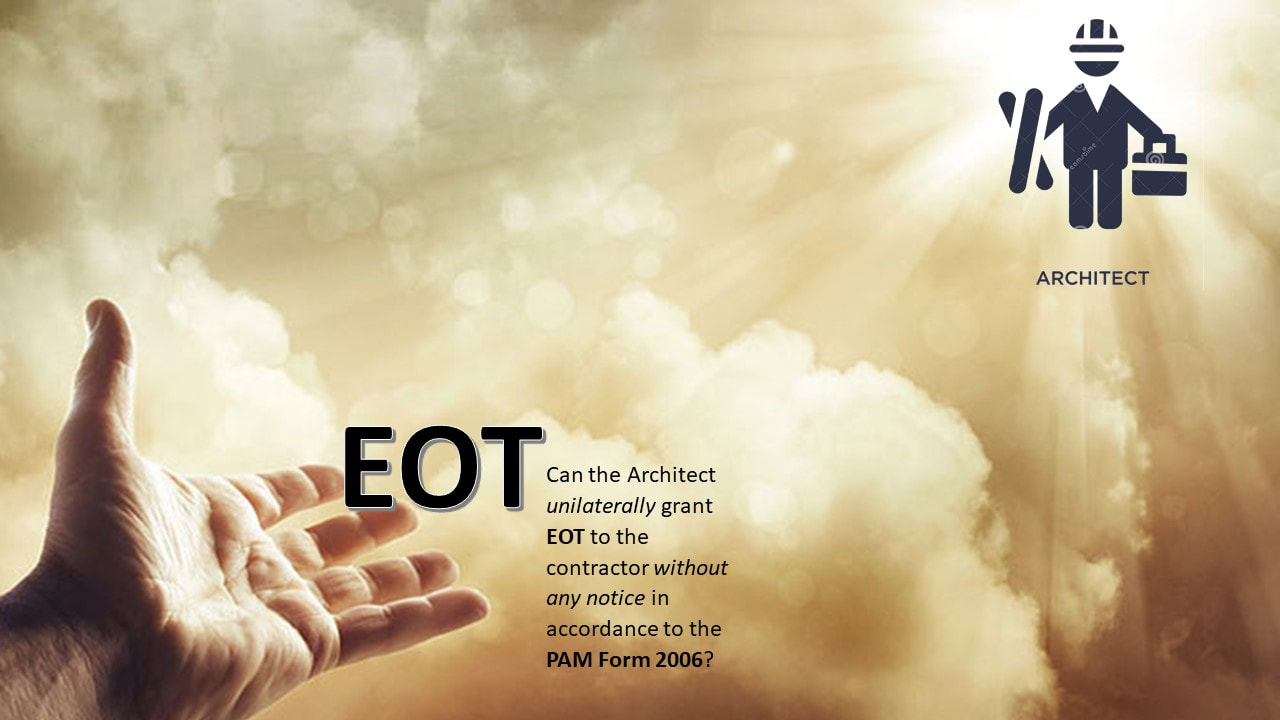Can the Architect unilaterally grant EOT to the contractor without any notice in accordance to the PAM Form 2006? Clause 23.1(a) of the said form stated that the giving of such notice shall be condition precedent to an entitlement of EOT. In contract law, a condition precedent is an event which must occur, unless its non-occurrence is excused, before performance under a contract becomes due. Sundra and Harban (2010) opined that the contractor shall on his own volition make such a notification as part of his implied obligation under the contract… citing NJ Carnell’s Causation and Delay in Construction Disputes as an early warning system to alert the parties to some occurrence of a potential EOT and to include such notice shall be a condition precedent, would mean that the employer is circumventing the effects of the ‘prevention principle’ as it benefitted its own breach, relying mostly on London Borough v Stanley Hugh Leach (1985) and Cabinets v Hili Morden Electronics Pty Ltd (1984). Undoubtedly, failure to serve a notice would result in the loss of rights by the contractor for EOT. Such position has been the original intent by the PAM Contract Drafting Committee (2010) citing Hudson’s Ed 4.132.
Reading in tandem with Clause 23.5(b), in assessing EOT the Architect may take into account and any other Relevant Events which in the Architect’s opinion will have an effect on the Contractor’s entitlement to an EOT, apparently this clause empowered the architect to make an opinion taking into account any other Relevant Events which may effect the contractor’s entitlement of EOT. Again, the opinion of the architect is limited to the provision set forth in Clause 23.8 with emphasise on Clause 23.8(x), any other ground of EOT expressly stated in the Contract. The PAM Contract Drafting Committee (2010) stated that the architect may consider any other relevant event which the contractor has not applied as a basis for his EOT. Sundra and Harban (2010) opined that the architect must nevertheless act reasonably and that the relevant event must be those stipulated in Clause 23.8 and no more, citing two Austrialian cases of Peninsular Balmain v Abigroup Contractors (2002) and Graymark Investment v Walter Construction (1999). Apparently, Clause 23.5(b) has been drafted to excuse the compliance of a notice as a condition precedent at the liberty of the architect, upholding the prevention principle that the defaulting party cannot benefits from its own breach. Reading in tandem with Clause 23.10, the Architect may … after CPC review and fix a completion date later than that previously fixed … upon reviewing a previous decision or otherwise and whether or not a Relevant Event has been specifically notified by the Contractor. The PAM Contract Drafting Committee (2010) view of this clause, the architect is empowered to review EOT previously granted after CPC, taking into consideration all relevant events that may have affected the completion date irrespective of whether or not the relevant event has been considered previously or has been notified by the contractor. In conclusion, the architect has the power to unilaterally grant EOT to the contractor without any notice in accordance to PAM Form 2006, relying on Clause 23.5(b), to enable the architect, to uphold his opinion that the defaulting party cannot benefits from its own breach and Clause 23.10, to allow the architect a chance to make the non-obligatory final review of his own opinion with regard to the EOT previously granted. With these two clauses in placed, it would also mean that the specific performance of giving of such notice shall be condition precedent to an entitlement of EOT shall only be binding to the contractor as a procedural condition in his application for EOT to give early warning to the architect of the impending delay and not necessarily result in the loss of his rights for EOT and by extension, claims for loss and/or expense.
0 Comments
|
DYA+CAuthorDYA+C is set up by Ar. DAVID YEK TAK WAI to undertake resolution of commercial disputes through ARBITRATION and ADJUDICATION, specializing in CONSTRUCTION PAYMENT DISPUTES. This is an educational blog. We do not guarantee, confirm nor warrant the accuracy of the information and facts stated therein. Read at your own 'risk'.
Archives
April 2024
Categories
All
|
- Home
- About
-
Practice
-
DYA + C
-
Consultant
-
Educator
- Author I am...
- Speaking Engagement >
- Attempting Law School
- Journey in USM(Arch) >
- Discourse in Studio 6 >
-
d:KON 4
>
- Actors >
-
Acts
>
- Portraiture
- A Slice of Space Time
- Box of Installation of Lights
- Radio Misreading
- Grid of Destinies
- Shelter
- Anatomy of Pain
- Tensigrity of Ego
- Of Prisons and Walls
- Forest of Nails
- Curtain of Fears
- Dissolution of the Ego
- If it's Ain't Broken it's Ain't Worth Mending
- Flight of Freedom
- Cross of Complexity and Contradiction
- interrogation
- Stage >
- Play
- Approach
- Galleria >
- External Critique >
- Philosophy
- Codes Regulations & Standards >
- Photo Essays
- Contact


 RSS Feed
RSS Feed
